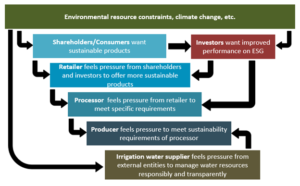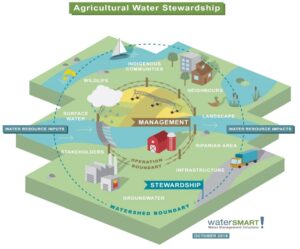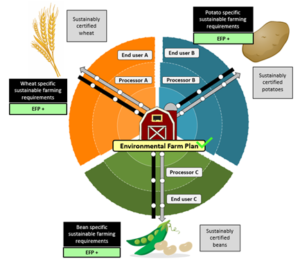CALGARY (November 2, 2022) – There is increasing attention and pressure on the agri-food industry, and on agriculture in general, to demonstrate sustainable practices and responsible management of natural resources. This increasing attention is coming from shareholders, investors, consumers, government, and other forces outside of the agriculture industry. Because there is no agreed-upon method to demonstrate sustainable sourcing there are currently a wide range of approaches being used, each with their own language and targets. This poses a problem for the industry because farms that sell to multiple different buyers may be required to complete a different set of sustainability documentation for each buyer. Existing documentation is onerous, despite asking for the same types of information, and this is anticipated to be the case for additional sustainability documentation. Another challenge for the agriculture industry is the highly contextual nature of sustainability. The best practices to protect and efficiently manage water and soil will be different for various types of farming, and in one farming region compared to another simply because of different natural and regulatory context. As a result, finding appropriate reporting metrics for all types and areas of farming is challenging.
The Agriculture’s Water Future (AWF) project is laying out a pathway to solve these key problems and meet the needs of the various levels in the agri-food supply chain. This will allow the producers in the industry to thrive, safeguard our natural resources, and ensure we can all enjoy healthy and affordable food.
All agriculture operations have risks to manage, including operational, regulatory, reputational, and financial risks related to water. The AWF project builds on water stewardship as the approach to proactively manage these risks, demonstrate sustainability, and benefit the operation and the local watershed. The AWF project aims to make it easy for producer operations of all sizes to get credit for what they are already doing and understand potential benefits from additional water stewardship actions they could implement.
Water stewardship refers to the use and safeguarding of freshwater resources in a way that is socially equitable, environmentally sustainable, and economically beneficial. Water stewardship also involves understanding the local context and water challenges being experienced by other water users and recognizing a site’s impacts on water beyond their fence line. It considers water governance, water use, and water quality, as well as sensitive areas such as wetlands, and access to drinking water and sanitation. This includes and goes beyond regular water management. A water steward must be aware of their role within the watershed.
AWF aims to help position Alberta’s agri-food sector as a global leader in water stewardship. The AWF project is focused on identifying ways to support each level of the supply chain, particularly the producer level, to align with the currently evolving landscape of water-related metrics and reporting in the agricultural and agri-food supply chain. The project is based on the perspective that water stewardship is an effective way to demonstrate sustainable sourcing and serves as an umbrella over what buyers could ask for.
As a pilot project, AWF is working through what water stewardship looks like for three levels of the potato supply chain and highlighting the benefits of a collaborative approach. The project has been working closely with an irrigation water supplier, a potato producer, and a potato processor, all located in the Oldman watershed in Southern Alberta. The project has also engaged an expert working group and relevant area stakeholders.
Upon completion in March 2023, the project will offer concrete examples and supporting tools for producers and other levels of the supply chain to tell their water stewardship story. Through the participation of three companies that are members of the potato supply chain, the project created useful example Water Stewardship Plans that document the planning process and the implementation actions. The project will support producers specifically with a straightforward way to document their current water stewardship practices and meet retailer demands using existing tools and documentation. The project will work to support appropriate updates to these existing tools so that they better capture and demonstrate water stewardship without increasing the level of effort required by the producers. The project will also produce a guidance document for understanding and implementing water stewardship in alignment with the Alliance for Water Stewardship Standard (AWS). AWS Standard is an internationally recognized standard for water stewardship, and it supports third-party verification. Click here to learn more about the AWS Standard.
One of the key documents that the project is working to help update is the Environmental Farm Plan which is whole farm and not crop specific and would support water stewardship for producers of all crops in Alberta.
Contact Information
Brie Nelson
brie.nelson@watersmartsolutions.ca



